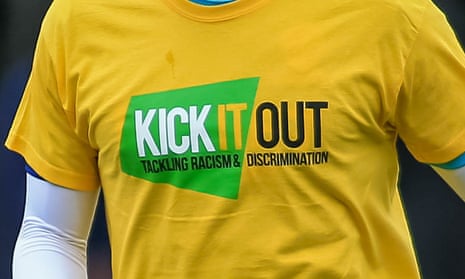Kick It Out has warned that a “shocking” increase in reports of racist and homophobic abuse in professional football last season is just the tip of the iceberg – and says it wants clubs and the police to share far more data so it can better understand and tackle the growing threat.
The organisation’s chair, Sanjay Bhandari, told the Guardian that Kick It Out did not know how much of abuse comes from children in their bedrooms or organised groups, and said that by aggregating as much data as possible, including from law enforcement, they would be able to get “better insight and intelligence and come up with more targeted response strategies to each category of offender”.
Bhandari’s comments came after Kick It Out reported 446 incidences of abuse reported during 2019-20 – a 42% increase on the previous season, despite hundreds of matches being played behind closed doors or postponed because of the pandemic.
“What we are really after is greater data sharing across the whole of football so that we can see what is below the waterline,” he said. “If we get that we will have a much better chance of having better insight and solutions. I compare this to computer hacking. When someone hacks, we know if they are a kid in a bedroom, if it’s ransomware or if it’s state sponsored. But we haven’t got those equivalent categories in football or society.
“We don’t know how much of this is coming from 12-year-old kids abusing Ian Wright or Wilfried Zaha, or organised groups. So we all look at the numbers and we go, ‘Isn’t that terrible’ and then everyone comes up with a story that tallies with their pet theory. I am angry that racism and discrimination still exists. But analytics is our strategy. We need to get better insights to have a better strategy.
“It could be a game-changer if we can get better data. And I would like Kick It Out to be that independent analytics provider and those are the conversations we are having.”
Reports detailing racist abuse went up by 53% from 184 to 282 and Kick It Out received 117 reports of abuse based on sexual orientation compared with 60 last season, a rise of 95%. However, some forms of discrimination related to religion and gender did decline.
A separate YouGov poll for Kick It Out, which surveyed more than 1,000 fans, found 30% of them had witnessed or heard racist comments or chants at a match in 2019 and 71% had seen racism on social media directed at a footballer. The survey also found 32% of fans said they had witnessed homophobic comments at a match.
“Our reports indicate a steep rise in discrimination reports over the last two years, which reflect the Hate Crime statistics from the Home Office that show marked national increases over the last four years,” Bhandari said. “But as our YouGov poll also confirms, we know that reports to Kick It Out are just the tip of the iceberg”.

Bhandari also warned that social media had become a “battleground of hate” and said everyone needed to do more to tackle the problem. “We need better regulation and enforcement and we need social media companies to be part of the solution,” he said.
“We need clubs and governing bodies to continue to lobby for change, sanction offending supporters and support law enforcement processes with the provision of evidence. We need players to continue to use their powerful voices. We all need to do more. We all need to take a stand.”
At grassroots level there were 94 reports compared with 113 in 2018-19, a fall of 14%. However, all grassroots matches from March 2020 were cancelled because of Covid-19 and so when comparing last season with the equivalent period the season before, there was an 11% increase in reports.
